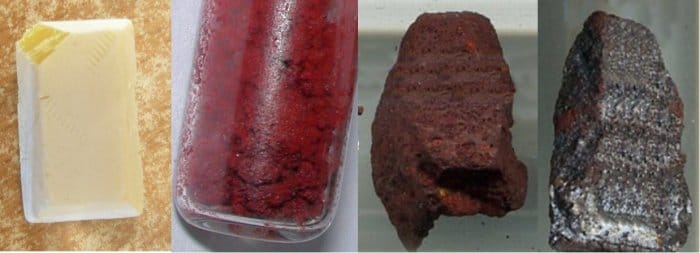phosphorus

Phosphorus comes into English from classical Latin, where Phosphorus is a name for the planet Venus. The name comes ultimately from the Greek; the roots are φως- (phos-, light) + -φόρος (-phoros, bringer). So phosphorus is the light-bringer, and the element is named for its luminescent properties. (Lucifer also literally means light-bringer in Latin, and it is also a name for the planet Venus. But unlike Lucifer, phosphorus is not a name for the angel that rebelled against God in the Christian mythos.) One also sometimes sees the clipped form phosphor.
It appears in a Latin-English dictionary of 1538, although this is a use of the Latin, not the English word:
Phosphorus, the daye sterre.
And again, we see the Latin name in an English text in a 1587 book on botony:
This tyrant (Nabuchadnezzar) is compared for the great magnificence and glorious pompe of his huge empire, vnto the goodlie Planet and glittering morning star, Lucifer: which being seene after the Sunne is gone downe, is called Vesperugo and Hesperus, and heereof speaketh Virgil where he saith,
Trudge, trudge apace home, full fed Goates,
The Euening Starre appeeres.
But in the morning, preceeding and going afore the Sunne, it is called Lucifer, and Phosphorus: and (of the glittering brightnes and amiable beautie, and shining colour which it hath) named also Venus.
The translation from Virgil’s Eclogue 6 is a rather loose one. The poem, which uses the name Vesper, reads:
Omnia quae Phoebo quondam meditante beatus
audiit Eurotas iussitque ediscere lauros,
ille canit (pulsae referunt ad sidera valles),
cogere donec ovis stabulis numerumque referre
iussit et invito processit Vesper Olympo.
(All the songs that of old Phoebus rehearsed, while happy Eurotas listened and bade his laurels learn by heart—these Silenus sings. The re-echoing valleys fling them again to the stars, till Vesper gave the word to fold the flocks and tell their tale, as he set forth over an unwilling sky.)
Finally, we get an anglicized use of the word in John Harvey’s 1588 A Discovrsive Probleme Concerning Prophesies in a passage about the 1572 supernova in the constellation Cassiopeia. Here phosphorus is being used to simply mean a star, not specifically the planet Venus:
Sithence his decease it is lately supposed by diuers Mathematicians, that the new strange star in Cassiopeia, which appéered, Anno 1572. was this Tyburtine sydous; but how vnequall is that paraphrase to the phrase of this prophesie? Or how vnlike is this description, to the manner, and effect of that new Phosphorus?
And we see Venus referred to as Phosphorus in Robert Parry’s 1595 Moderatus, the Most Delectable and Famous Historie of the Blacke Knight:
When Phosphorus declining West her tracke,
Commaunding Nox her charge to take in hand
And for to spread abroad her curtaine blacke,
By Natures course to couer both sea and land
The chemical element, with atomic number 15 and the symbol P, was discovered in 1669 by alchemist Hennig Brand, who distilled it from urine, which contains a significant amount of phosphates. Phosphorus is the first element not known the ancients to be discovered. It was recognized as an element by chemist Antoine Lavoisier in 1777.
The name of the element appears in Latin by 1675 and in English by 1680. It is so called because it can emit a glow and some forms will spontaneously combust in the presence of oxygen.
Sources:
The Dictionary of Syr Thomas Eliot Knyght. London: Thomas Berthelet, 1538, sig. R.v.r. ProQuest: Early English Books Online (EEBO).
Harvey, John. A Discovrsive Probleme Concerning Prophesies. London: John Jackson for Richard Watkins, 1588, 42–43. ProQuest: Early English Books Online (EEBO).
An Herbal for the Bible. London: Edmund Bollifant, 1587, 255. ProQuest: Early English Books Online (EEBO).
Miśkowiec, Pawel. “Name Game: The Naming History of the Chemical Elements—Part 1—From Antiquity till the End of 18th Century.” Foundations of Chemistry. 1 November 2022. DOI: 10.1007/s10698-022-09448-5.
Oxford English Dictionary, third edition, March 2006, s.v. phosphorus, n., phosphor, n. and adj.
Parry, Robert. Moderatus, the Most Delectable and Famous Historie of the Blacke Knight. London: Richard Jones, 1595, sig. D.2.v. ProQuest: Early English Books Online (EEBO).
Virgil. “Eclogue 6.” In Eclogues. Georgics, Aeneid: Books 1–6. Jeffrey Henderson, ed. H. Rushton Fairclough, trans. Revisions by G. P. Goold. Loeb Classical Library 63. Cambridge, Massachusetts: Harvard University Press, 1999, lines, 82–86, 66–67.
Photo credit: Peter Krimbacher, 2005. Wikimedia Commons. Used under a Creative Commons Attribution-Share Alike 3.0 Unported license.